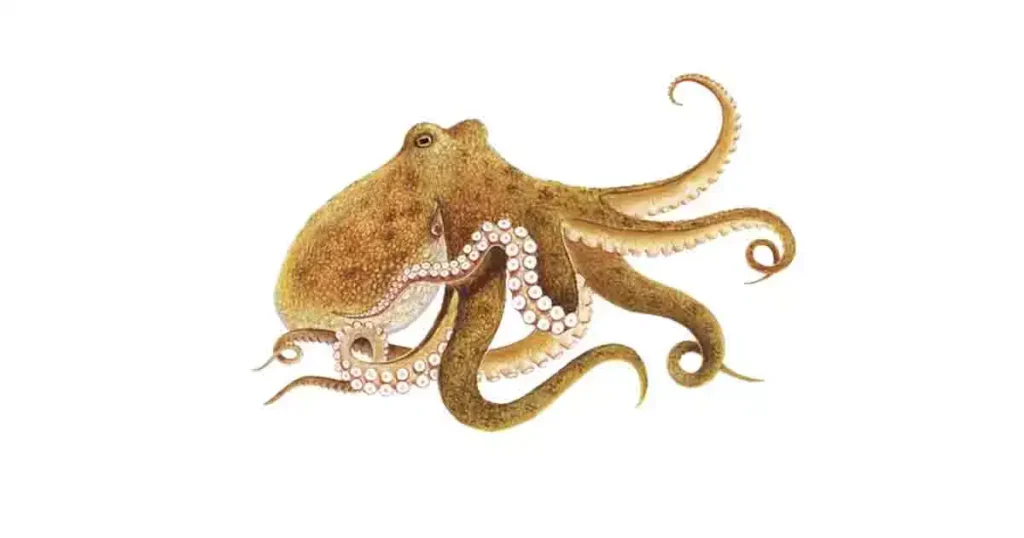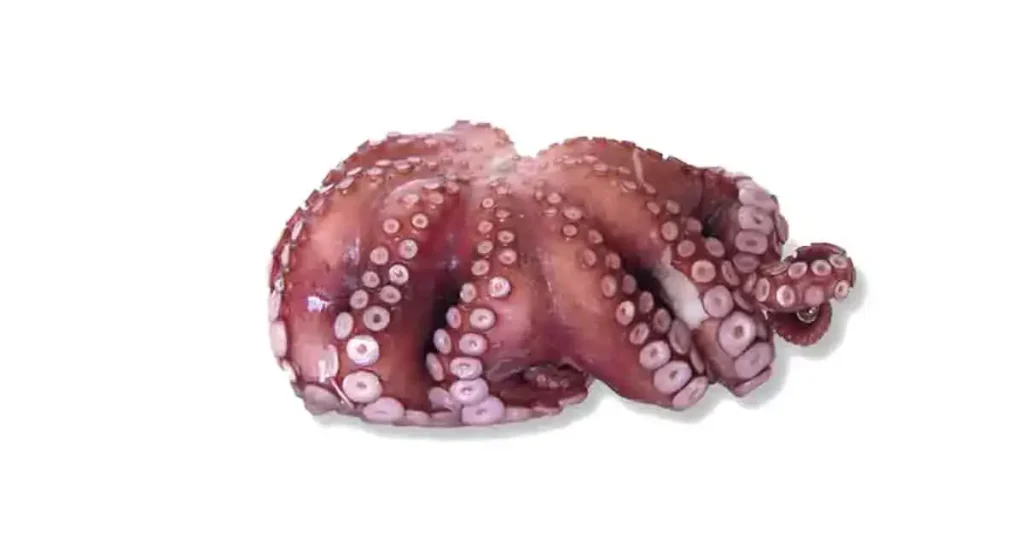Octopus is very exotic to have on a restaurant menu. Some restaurants might have it, but standard restaurants have fewer chances. Many may not see Octopus as an edible food they want on the plate, but some make love eating Octopus for dinner. Different types of Octopus are available in the market, and each one will have its own separate pricing and demand.

This article will go through the details of Octopus and its pricing in the modern market. We will also focus on the benefits and nutrients that come with the out exotic seafood.
| Telugu Name | Aktipus |
| Kingdom | Animalia |
| Phylum | Mollusca |
| Class | Cephalopoda |
| Clade | Vampyropoda |
| Superorder | Octopodiformes |
| Order | Octopoda |
Octopus in Telugu pronunciation
Octopus in Telugu spells out the same as the english variant; the pronunciation of the word Octopus falls into the same circle as the english name. In short, you will not have trouble learning the Telugu variant of Octopus, as both English and Telugu words for Octopus are basically the same. You can speak Telugu or English in the local market, and they will quickly understand the type of seafood you are looking for.
Shopping online would stay the same as most websites that sell Octopus stick to its english name, even if the website is focused on the Telugu language. Octopus is one of the many plates of seafood that are well-known worldwide. Uttering the english word will get you what you are looking for without any issues.
The popularity of the Octopus has given way to many markets opening their arsenal to more seafood types. People interested in these exotic foods have caused a need to change their shift towards more acceptable foods. Octopus is getting very popular fast, thanks to social media.
Benefits of Octopus
Nutrients will reflect on how many benefits they have to provide to the body. This section will go through all the benefits Octopus has to offer. Many Indian culinary and cultural traditions have Octopus as the main dish.
1. Protein
Most protein that comes with the Octopus is lean as it contains calories, fat, and cholesterol. A 25 gram of protein comes with 140 calories; too many Octopus fits the description of lean protein. It includes a decent amount of cholesterol compared to squid and shrimp.
2. Rich source of healthy unsaturated fats
Healthy unsaturated omega-3 fatty acid makes the Octopus a better food to prevent heart disease, and it’s also been linked to lowering the risk of cancers, cognitive function, and a healthy gut microbiome boost.
3. Antidepressant properties
Research shows moderate consumption of Octopus leads to lower measures of depression. The diet-rich omega-3 from seafood links to reducing depression. Some might not know, but Octopus does rank 6th on the list of top food for an antidepressant.
Research here is lacking, so we have yet to discover all the potential benefits of eating Octopus. So far, in our research on seafood, Octopus makes an excellent choice for the nutrients side of things as it contains many healthy nutrients that offer some benefits to keep our health better.
Side effects of consuming Octopus
Allergic reactions are a big part of seafood dishes, Octopus offers plenty of nutrient-dense sources of protein, but the seafood’s allergic aspect is also present here. Some might not ever eat it because of ethical reasons.
1. Salt present
They are high in salt, excluding the salt you need to add for the cooking process, so you can imagine the amount of salt you will consume over one Octopus. If your body is salt sensitive, consuming Octopus will lead to high blood pressure and risk of heart disease.
2. Fried
Deep fried Octopus might sound tasty, but usually has adverse health outcomes. The list includes high blood pressure, heart disease, depression, diabetes, and more.
3. Mercury
Lastly, mercury exposure, most seafood does have this problem of heavy metals such as mercury and arsenic being part of their body. Pregnant and breastfeeding people and children should lower the consumption of most seafood.
Nutrients found in Octopus
Here are all the nutrients in the Octopus and why they matter to our bodies. Most people who consume Octopus rather see them as a decent amount of value food with many benefits and fewer side effects; they are very much low on calories, so if you are watching weight, you don’t need to worry about consuming them. Some people may not know, Octopus also has low amount of fat and carbohydrates, but they do carry a lot of amino acids, which translates to protein in our body,
The nutrients mentioned below are taken from 85 grams of Octopus cooked by moist heat cooking method, which is very traditional in the coastal area of india. Most restaurants do prefer to boil the seafood and fry them.
| Nutrient | Amount |
|---|---|
| Calories | 139 |
| Carbs | 4 grams |
| Protein | 25 grams |
| Fiber | 0 grams |
| Fat | 2 grams |
| Vitamin B12 | 1,275% of the Daily Value (DV) |
| Selenium | 139% of the DV |
| Copper | 70% of the DV |
| Iron | 45% of the DV |
| Vitamin B6 | 32% of the DV |
| Zinc | 26% of the DV |
| Niacin | 20% of the DV |
| Phosphorus | 19% of the DV |
| Sodium | 17% of the DV |
| Pantothenic acid | 15% of the DV |
| Choline | 13% of the DV |
| Magnesium | 12% of the DV |
| Potassium | 11% of the D |
The number of nutrients here can add a lot of benefits to our body and our overall diet. Dried Octopus contains around 1,114 mg of salt compared to fresh cooked Octopus. Dried Octopus contains more salt than cooked Octopus. Canned Octopus is packed with oil and has more fat. Deep-fried food will have high fat and calories compared to seafood roasted, grilled, stewed, and poached.
Octopus contains rich source nutrients such as Vitamin B12 and selenium, making it perfect for red blood cells, synthesizing DNA, and harmful oxidation. They are considered heart-healthy nutrients that can reduce inflammation and protect against heart disease. In short, seafood is low in calories and fat and contains vitamins B6, B12, copper, iron, zinc, and more.
some photos of octopus


Cost of Octopus in Telugu areas
The cost here will be between 200 to 400 rupees; again, the premium quality octopus will have a higher rating than them so will the price. Every aspect of the Octopus will reflect on the price. If you are looking for a premium-grade octopus, you must fork over a few bucks. Local markets might have a more leisurely rate on seafood; meanwhile, the online scene could differ. Online markets tend to have higher prices since most local coastal zones will have a lower price for the products.
Decent quality octopus will come under the 200 rupees threshold; in some local markets, you will find the Octopus under 100 rupees. But that is an infrequent occurrence, as many coastal local markets will have discounts on seafood purchases and the sales tag on the bulk sales. If you can’t find it, you can use online services.
If you want the variety of your Octopus, you must shop online, as local markets will have a minimal range of octopus types. The online market will allow you to access various kinds of Octopus, ranging from cheap to expensive. The taste and the crafting style for cooking will also differ from one type to another. It is not easy to cook an octopus; going for quality will also make the task challenging.
The location also changes the cost of the Octopus, and you need to make sure you are buying it from the right place, a store with good service ratings. You can jump online and look through the reviews to make an educated decision.
Local scene of Octopus in Telugu
Sea foods are evident in their approach, as people have found a way to extend the variety of dishes. Seafood is prevalent for many reasons; one is the sheer variety it offers to our taste buds. Octopuses are no different than any other seafood in the market. The local scene of the Octopus cooking dishes is very much the same as the other seafood-related dishes.
Octopus can be taken frozen, fresh, canned, and dried. Some prefer to take the Octopus either raw or cooked. All seafood is usually eaten fresh or as a curry. Curry seems to be the best choice in any of the Indian coastal areas. As new spice ingredients have made the curries differ and taste better than the others. The variety of tastes also affects the price range, and different types of seafood follow the same pattern. You will find various Octopus curries grilled, baked, steamed, boiled, poached, stewed, and fried.
Octopus is a complicated beast to cook; it could take different flavor and texture profiles to make it work properly. The type of Octopus also matters when it comes to cooking. And going to be unhappy with the final product since Octopus is known to be very chewy. The art here is to make the Octopus less demanding. It can get challenging to make the Octopus less demanding; only professional chews know how to deal with the Octopus without ruining it.
Most local restaurants take at least 90 minutes to cook the Octopus and leave the dish with a less rubbery texture. But if you want to avoid dealing with the time, then you can approach the canned Octopus to take your food without dealing with the waiting that comes with a dish. Canned octopuses are also very popular, and they don’t want to wait.
You take the canned Octopus directly or mix it with garlic, herbs, spices, citrus juices, and some seasonings. Fresh octopuses are usually taken in means but frozen, dried, and canned variations make the dish more interesting. The local scene here is booming with creativity, especially in the restaurants and fast food aisle. If you plan to try some of the new dishes out, looking at the fast food scene for a diverse taste is better.
Conclusion
Octopus in Tamil pronunciation is the same as the English name, so you will have no trouble uttering the word, as it sounds very similar. There are benefits, but you will also have access to plenty of side effects that are very common or common with people who don’t fit well with the seafood types.
The price and popularity of Octopus are very demanding in the cities, but they are very prevalent in the coastal areas. The price will often be lower in the coastal regions, but there will be limited variants of Octopus. But when you move on to online or any store in the city, you will have more variants.
FAQ
Here are the most asked questions about Octopus on the internet.
Can Octopus be eaten?
Octopus can be eaten, as they are one of the most popular culinary delicacies around coastal areas of the world/ where sea foods are rampant. Most people who prefer to eat Octopus live in Asia pacific countries such as Japan and Korea. Most Mediterranean countries, such as Italy and Spain, choose to have their hand around Octopuses.
Again just like every other seafood, Octopus can be pretty cheap and expensive. It all depends on the quality; most people in the coastal area have access to the most affordable variant of Octopus. The popularity of Octopus in these regions is enormous since it is reasonable and does have plenty of benefits, as mentioned earlier in the article.
Is Octopus cheap?
Yes, the common variants of Octopus are very cheap and affordable. Many people from the coastal area do take Octopuses almost every day. T has a good source of nutrients and other vitamin values that do wonders for health. Mixing the Octopus with average everyday food does help elevate the dish for many people who have lived in the coastal area for a long time.
While at the same time, you will have access to premium quality Octopus, the cost here will be widely different. Since the taste and the preparation for these exotic quality Octopus will be different from the average quality Octopus.
Should you eat Octopus?
It all comes down to preference, and if you ever ate an Octopus before, you can try out the different types. But sometimes, seafood does not bode well with the body. Not all bodies will accept seafood as regular food. Some people are allergic to seafood. That list also includes Octopus. Ask your doctor or any health adviser before considering going to an Octopus.
If your body is allergic, then you might cause a lot of damage to the internal organs by eating an Octopus or any seafood. Always ask a doctor before putting any seafood on the table.

